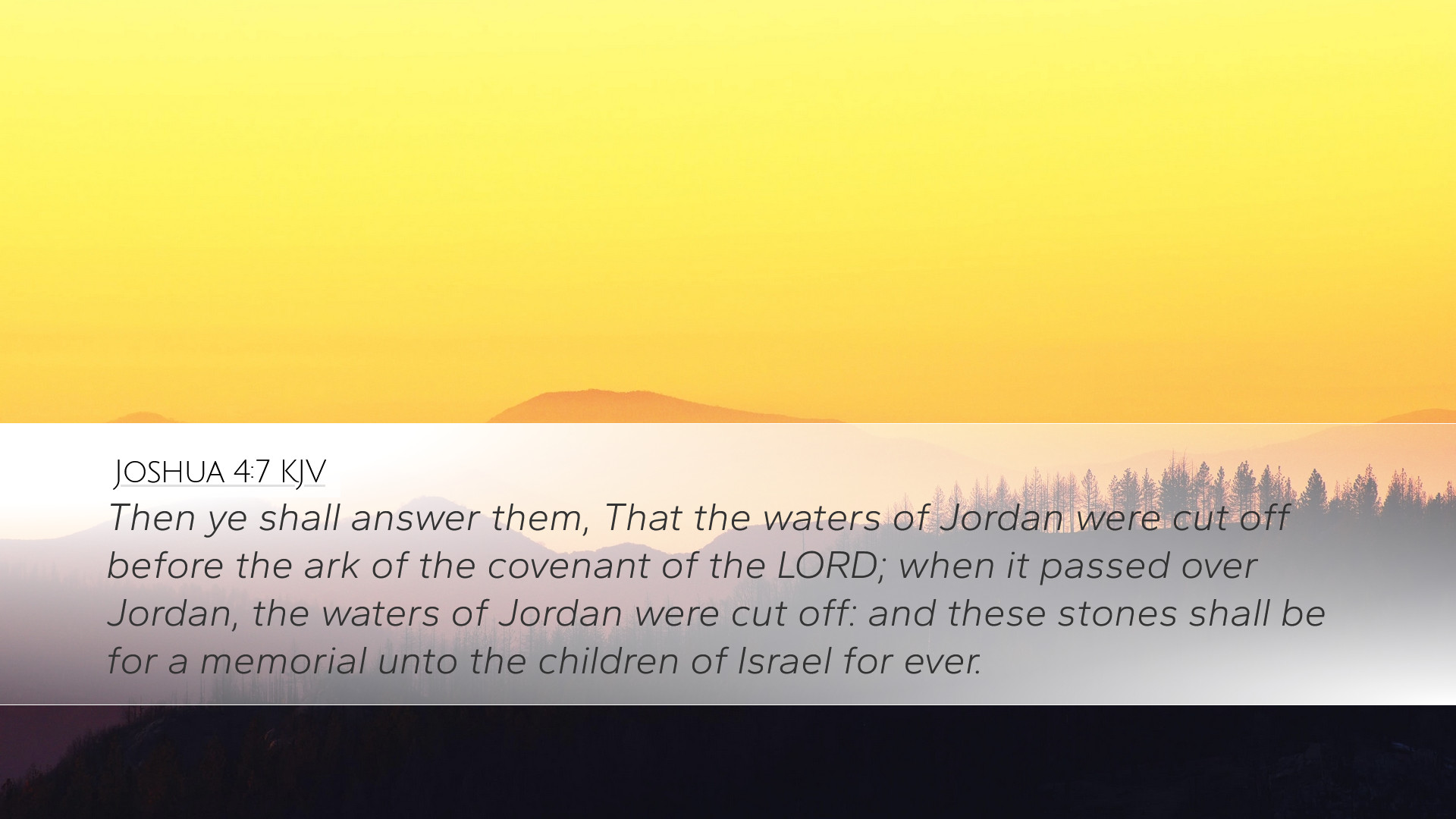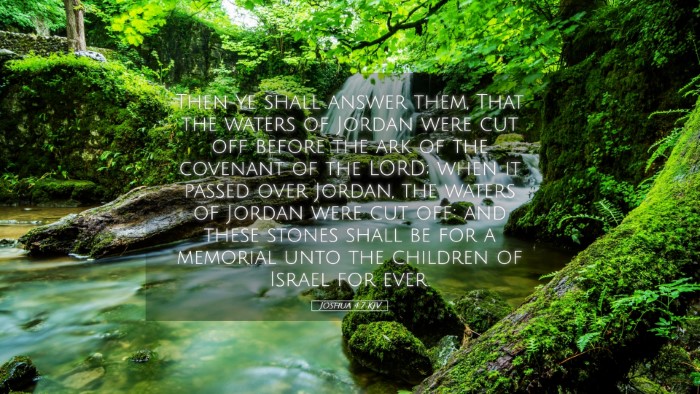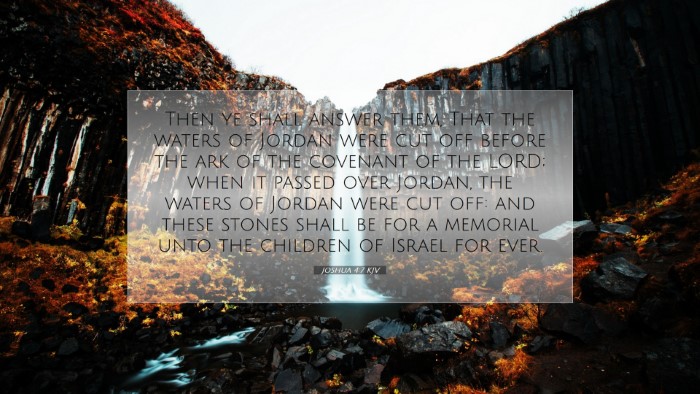Old Testament
Genesis Exodus Leviticus Numbers Deuteronomy Joshua Judges Ruth 1 Samuel 2 Samuel 1 Kings 2 Kings 1 Chronicles 2 Chronicles Ezra Nehemiah Esther Job Psalms Proverbs Ecclesiastes Song of Solomon Isaiah Jeremiah Lamentations Ezekiel Daniel Hosea Joel Amos Obadiah Jonah Micah Nahum Habakkuk Zephaniah Haggai Zechariah MalachiJoshua 4:7
Joshua 4:7 KJV
Then ye shall answer them, That the waters of Jordan were cut off before the ark of the covenant of the LORD; when it passed over Jordan, the waters of Jordan were cut off: and these stones shall be for a memorial unto the children of Israel for ever.
Joshua 4:7 Bible Commentary
Commentary on Joshua 4:7
Verse Overview: Joshua 4:7 states, “Then you shall tell them that the waters of the Jordan were cut off before the ark of the covenant of the Lord. When it crossed over the Jordan, the waters of the Jordan were cut off. And these stones shall be for a memorial to the children of Israel forever.” This passage emphasizes the significance of remembrance and the miraculous nature of God's intervention in the lives of His people.
Insights from Matthew Henry
Historical Context: Matthew Henry points out that the act of crossing the Jordan River was a critical moment in Israel's history, transitioning from wilderness wanderings to the Promised Land. The stones, taken from the Jordan, served as a memorial, reminding future generations of God's power and faithfulness.
Spiritual Significance: Henry notes that the stones represent a physical testament to God's miraculous intervention. They are a reminder that the waters were held back, indicating that God is capable of controlling creation for the sake of His covenant people. This miracle was not only for the current generation but designed for teaching future generations about God’s mighty acts.
- Teaching Future Generations: The instruction to tell their children of these events highlights the importance of passing down faith and history, ensuring that the knowledge of God's deeds persists through time.
- A Call to Faith: The stones stand as a challenge to believers to recognize and remember God's past provisions, fostering a deeper faith and reliance on Him in future endeavors.
Insights from Albert Barnes
Theological Implications: Albert Barnes underscores that the act of memorializing the crossing of the Jordan is an integral part of Israel's spiritual heritage. He explains that these stones bear witness not only to the event but also to God’s continued presence and guidance in Israel's journey. Barnes emphasizes, “Remembering what God has done brings us to a place of trust and expectation for what He will do.”
Symbolic Meaning of Water and Stones: The separation of waters symbolizes God's authority over nature, while the stones become a tangible representation of His covenant. Barnes elaborates on the idea that the Jordan represents trials that believers must pass through, often with God’s divine assistance.
- Memorializing Work: The physical stones serve as an important reminder to God’s people of His power and love throughout their history.
- Encouragement for Community: This communal memorial also fosters unity among the Israelites, reinforcing their collective identity as God's chosen people.
Insights from Adam Clarke
Exegesis of the Text: Adam Clarke interprets the phrase “these stones shall be for a memorial” as fundamentally linking the act of remembrance to the dynamics of faith. He argues that human memory and divine action are intricately woven together in the fabric of biblical narrative, promoting continual reflection on past experiences with God.
Application for Believers: Clarke suggests that the practice of setting up memorials can be applicable today. Just as Israel was instructed to remember God's deliverance, Christians today are encouraged to find ways to commemorate God's actions in their lives, which could assist in nurturing their faith. He reflects on how spiritual milestones can solidify belief within communities.
- Strengthening Faith: Clarke asserts that recounting past blessings and deliverances builds faith in God’s future promises.
- Stones A Metaphor for Life: The stones can be viewed as metaphorical markers in the believer’s journey, indicating moments where God has intervened in miraculous ways.
Conclusion
Joshua 4:7 serves as a profound reminder of the importance of memorializing God's mighty acts. Insights from Matthew Henry, Albert Barnes, and Adam Clarke bring to light the various dimensions of this verse, encompassing historical significance, theological implications, and practical applications for believers today. By understanding the significance of the stones in Joshua's narrative, scholars, pastors, and students are reminded to actively engage in remembering and sharing the astonishing works of God, reinforcing their faith and that of future generations.


